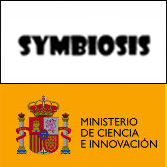
Start: 01/01/2012
End: 31/12/2014
Funding: National
Status: Completed
End: 31/12/2014
Funding: National
Status: Completed
Research unit:
Mobile Networks (MONET)
Acronym: SYMBIOSIS
Code: TEC2011-29700-C02-01
Mobile Networks (MONET)
Acronym: SYMBIOSIS
Code: TEC2011-29700-C02-01
Recent years have witnessed a substantial growth of mobile data consumption, and unlike in previous generations of networks, this is expected to move the bottleneck from the access to the core. As a consequence, all types of networks are putting mechanisms into place to cope with the characteristics and volumes of such mobile data traffic. This is particularly relevant for 3GPP cellular networks (e.g., the Evolved Packet System, or EPS) in terms of both signaling and data traffic, due to their mostly centralized and stateful architecture. In this context, cellular networks attract particular interest because of their ubiquity and mobility support, as well as their carrier-grade performance, and this is why the project also studies in detail these networks.
From a network architecture point of view, 3GPP cellular networks and data networks (e.g., the Internet) have been traditionally designed in an almost independent manner. Therefore, there is the need to take a fresh look at the implications of what each of these communities is defining and the best way to make them work together at a global scale. In fact, making both worlds more permeable to external influences may result in mutual benefits. This is the main motivation for this project. We believe that in so doing, the performance: 1) inside each specific network (with particular emphasis on cellular networks), and as a consequence, 2) on an end-to-end basis, through the Internet, will be substantially improved.
As a consequence, there is a clear need to analyze in an as objective way as possible where is this pervasive mobile data world heading to from a technical perspective. More specifically, SYMBIOSIS will mainly focus on studying, conceiving, and evaluating network-level services (e.g., routing, mobility, global resource management) towards a more efficient operation of mobile broadband networks at a global scale. In particular, SYMBIOSIS aims:
• To improve cellular network performance by having in mind the requirements posed by mobile data and how the mechanisms under study by the data networking community can help (e.g., overlay network service provisioning, distributed location management, self-organized interference management in dense uncontrolled deployments).
• To put cellular networks into a global context and to study network schemes enabling their integration with other networks (using the same or different technologies). In this direction, we will explore schemes defined to solve critical Internet problems, such as routing scalability (e.g., LISP). This also includes ways of providing critical network-level services at a global scale (e.g., routing, mobility). Scenarios representing various degrees of integration will be evaluated.
As for the research framework of SYMBIOSIS, at a theoretical level, enabling techniques (e.g., artificial intelligence) will be studied to assess to what extent they could help in fulfilling the above goals. Besides, there are two main framework components that are the key for the success of this project, namely the simulation framework (based on the open source ns-3 simulator) and the experimental framework (based on the EXTREME Testbed® and LISP Pilot Network). In addition to acting as enablers of academic results (e.g., publications), we also plan to use these frameworks as enablers of technology transfer activities. Furthermore, we also think that the technologies under study as well as the frameworks in use make project SYMBIOSIS a remarkable training environment not only for students already working in the groups involved and those to come, but for the team as a whole.
From a network architecture point of view, 3GPP cellular networks and data networks (e.g., the Internet) have been traditionally designed in an almost independent manner. Therefore, there is the need to take a fresh look at the implications of what each of these communities is defining and the best way to make them work together at a global scale. In fact, making both worlds more permeable to external influences may result in mutual benefits. This is the main motivation for this project. We believe that in so doing, the performance: 1) inside each specific network (with particular emphasis on cellular networks), and as a consequence, 2) on an end-to-end basis, through the Internet, will be substantially improved.
As a consequence, there is a clear need to analyze in an as objective way as possible where is this pervasive mobile data world heading to from a technical perspective. More specifically, SYMBIOSIS will mainly focus on studying, conceiving, and evaluating network-level services (e.g., routing, mobility, global resource management) towards a more efficient operation of mobile broadband networks at a global scale. In particular, SYMBIOSIS aims:
• To improve cellular network performance by having in mind the requirements posed by mobile data and how the mechanisms under study by the data networking community can help (e.g., overlay network service provisioning, distributed location management, self-organized interference management in dense uncontrolled deployments).
• To put cellular networks into a global context and to study network schemes enabling their integration with other networks (using the same or different technologies). In this direction, we will explore schemes defined to solve critical Internet problems, such as routing scalability (e.g., LISP). This also includes ways of providing critical network-level services at a global scale (e.g., routing, mobility). Scenarios representing various degrees of integration will be evaluated.
As for the research framework of SYMBIOSIS, at a theoretical level, enabling techniques (e.g., artificial intelligence) will be studied to assess to what extent they could help in fulfilling the above goals. Besides, there are two main framework components that are the key for the success of this project, namely the simulation framework (based on the open source ns-3 simulator) and the experimental framework (based on the EXTREME Testbed® and LISP Pilot Network). In addition to acting as enablers of academic results (e.g., publications), we also plan to use these frameworks as enablers of technology transfer activities. Furthermore, we also think that the technologies under study as well as the frameworks in use make project SYMBIOSIS a remarkable training environment not only for students already working in the groups involved and those to come, but for the team as a whole.
Josep Mangues
Researcher
Biljana Bojovic
Researcher
Paolo Dini
Researcher
Manuel Requena
Researcher
Jorge Baranda
Researcher
Marco Miozzo
Researcher
Centre Tecnològic de Telecomunicacions de Catalunya
Coordinator
Coordinator
No results found
